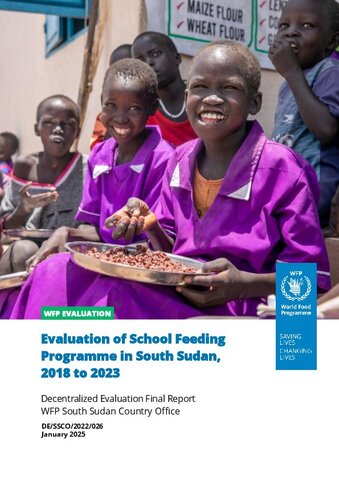
Since 2011, the WFP South Sudan Country Office has been implementing the School Feeding Programme (SFP), aiming to ensure that school-age children have access to safe and nutritious food and to enhance the livelihoods and resilience of food insecure smallholders in non-conflict zones. From 2018 to 2023, the program supported over 900 schools with a budget of USD 226 million.
The evaluation team conducted a summative evaluation with mixed methods using a cross-sectional comparative study design. A with/without analysis was used to evaluate the effects of the SFP by comparing the outcomes for students in schools who received SFP assistance with the outcomes of those who did not.
Evaluation findings
The evaluation found that the programme was highly relevant and coherent; effective in achieving its objectives with many positive features relating to its outputs and outcomes; as well as positive effects and contribution to students’ learning outcomes. Basic literacy and numeracy scores were significantly higher in intervention schools than in comparison schools, more so for boys than girls. The SFP was not complemented with sufficient infrastructural development to meet the demands of the higher enrolment of children in intervention schools. The programme was limited in both efficiency and effectiveness by severe funding cuts in the face of escalating humanitarian and programme needs.
There was political commitment to the programme with evidence of buy-in and national ownership. However, an important threat to the sustainability of the programme was the limited financial commitment by the Government. The evaluation identified the home-grown school feeding (HGSF) approach where produce is procured locally and a multi-sectoral approach (including infrastructure at school level) as holding key potential for sustainability.
Key recommendations
- Prioritize fundraising for school feeding given the evidence in this evaluation of severe food deprivation in households and the better learning outcomes in the intervention schools.
- Generate evidence from the HGSF programme (in view of the evolving funding climate) through research/evaluation to gain insight into its effectiveness in strengthening local food systems.
- Strengthen the programme monitoring system.
- Develop a more inclusive approach towards persons living with disabilities (PLWD).
- Improve community participation in the design and implementation of the programme.
- Intensify investment in government technical capacity for the logistical management of school feeding at national and state levels in all future WFP school meals programmes.
